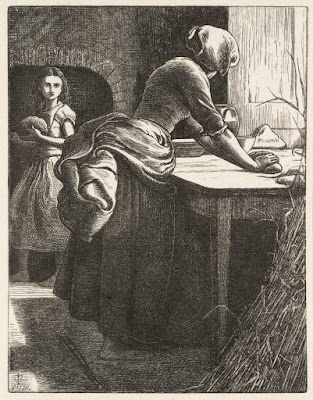SECOND GREAT GROUP OF PARABLES
(Probably in Peræa)
Subdivision E
PARABLE OF THE UNRIGHTEOUS STEWARD
LUKE 16:1-18
The Parable of the Dishonest Manager
Jesus directs this parable to a broad group of disciples. Others are present, including his opposition. This parable is unique to Luke.
"The master commended the dishonest manager for his shrewdness. For the sons of this are more shrewd in dealing with their own generation than the sons of light. And I tell you, make friends for yourselves by means of unrighteous wealth, so that when it fails they may receive you into the eternal dwellings." Luke 16:8-9
This translation from The Message is helpful:
"Streetwise people are smarter in this regard than law-abiding citizens. They are on constant alert, looking for angles, surviving by their wits. I want you to be smart in the same way—but for what is right—using every adversity to stimulate you to creative survival, to concentrate your attention on the bare essentials, so you'll live, really live, and not complacently just get by on good behavior." Luke 16:8-9
 This is an awkward parable that leaves me conflicted-- "So the manager is irresponsible, and he's compounding that by being further underhanded, but wait...Jesus uses him as an example of how we should be?" I can do all of the mental cartwheels necessary to understand his point here, but if I'm honest, I still wonder why he used such a backward illustration.
This is an awkward parable that leaves me conflicted-- "So the manager is irresponsible, and he's compounding that by being further underhanded, but wait...Jesus uses him as an example of how we should be?" I can do all of the mental cartwheels necessary to understand his point here, but if I'm honest, I still wonder why he used such a backward illustration.A straightforward explanation of this parable from the BKC:
"The dishonest manager had not done a good thing. But he had been careful to plan ahead, using material things to insure a secure future. Jesus was not teaching that His disciples should be dishonest. He was teaching that they should use material things for future spiritual benefit. This was a good lesson from a bad example." -BKC
Another clarification of the message:
"The lord does not absolve the steward from guilt and he was apparently dismissed from his service. His shrewdness consisted in finding a place to go by his shrewdness." -RWP
The lord does not absolve the steward from guilt and he was apparently dismissed from his service. His shrewdness consisted in finding a place to go by his shrewdness. -F.B. Meyer
“This is the moral of the whole parable. Men of the world in their dealings with men like themselves are more prudent than the children of light in their intercourse with one another” (Plummer). We all know how stupid Christians can be in their co-operative work in the kingdom of God, to go no further.-RWP
The Pulpit Commentary elaborates further:
"There is underlying the Lord’s deep and sorrowful reflection here, a mournful regret over one feature that is, alas! characteristic of well-nigh all religious life—the unkindness which religious professors so often show to one another. One great division of Christianity despises, almost hates, the other; sect detests sect; a very slight difference in religious opinion bars the way to all friendship, often to even kindly feeling. With truth Godet remarks here "that the children of this world use every means for their own interest to strengthen the bonds which unite them to their contemporaries of the same stamp, but, on the other hand, the children of light neglect this natural measure of prudence." -Pulpit Commentary
It's sad but comforting to think that Christ was aware of our religious pettiness.
Other interesting bits:
"quickly. It was a secret and hurried transaction." -E.W. Bullinger
"ashamed. Ashamed to beg, but not ashamed to embezzle." -E.W. Bullinger
So yes, this person's character was poor.
"I have decided what to do, so that when I am removed from management, people may receive me into their houses.’ " Luke 16:4
may receive me, etc. — Observe his one object - when cast out of one home to secure another. This is the key to the parable, on which there have been many differing views. -JFB
This commentary points out the parallel imagery; the dishonest manager wants to cut deals so he will be welcome in human homes, but Jesus re-purposes the imagery to point to ultimate acceptance in eternal "homes."
"...so that when it fails they may receive you into the eternal dwellings." Luke 16:9
"And if you have not been faithful in that which is another's, who will give you that which is your own?" Luke 16:12
Another good point:
"In worldly goods, which are called other men's because they are not ours, but rather entrusted to our care." -Geneva Bible
Although not bearing on this parable directly, I like this commentator's framing perspective:
"It is true that Jesus Himself did not originate much in this department of Christian ethics, and probably for most of His sayings we can find a synonym struck from the pages of earlier, and perhaps heathen moralists; but in the wide realm of Right there can be no new law. Principles may be evolved, interpreted; they cannot be created." -Expositor's Bible
"In the mind of Jesus conduct was the outward and visible expression of some inner invisible force. As our earth moves round its elliptic in obedience to the subtle attractions of other outlying worlds, so the orbits of human lives, whether symmetrical or eccentric, are determined mainly by the two forces, Character and Circumstance. Conduct is character in motion; for men do what they themselves are, i.e. as far as circumstances will allow. And it is just at this point the ethical teaching of Jesus begins. He recognizes the imperium in imperio, that hidden world of thought, feeling, sentiment, and desire which, itself invisible, is the mould in which things visible are cast. And so Jesus, in His influence upon men, worked outward from within. He sought, not reform, but regeneration, molding the life by changing the character, for, to use His own figure, how could the thorn produce grapes, or the thistle figs?" -Expositor's Bible
"Fidelity depends not on the amount entrusted, but on the sense of responsibility. He that feels this in little will feel it in much, and conversely." -JFB
Although not bearing on this parable directly, I like this commentator's framing perspective:
"It is true that Jesus Himself did not originate much in this department of Christian ethics, and probably for most of His sayings we can find a synonym struck from the pages of earlier, and perhaps heathen moralists; but in the wide realm of Right there can be no new law. Principles may be evolved, interpreted; they cannot be created." -Expositor's Bible
"In the mind of Jesus conduct was the outward and visible expression of some inner invisible force. As our earth moves round its elliptic in obedience to the subtle attractions of other outlying worlds, so the orbits of human lives, whether symmetrical or eccentric, are determined mainly by the two forces, Character and Circumstance. Conduct is character in motion; for men do what they themselves are, i.e. as far as circumstances will allow. And it is just at this point the ethical teaching of Jesus begins. He recognizes the imperium in imperio, that hidden world of thought, feeling, sentiment, and desire which, itself invisible, is the mould in which things visible are cast. And so Jesus, in His influence upon men, worked outward from within. He sought, not reform, but regeneration, molding the life by changing the character, for, to use His own figure, how could the thorn produce grapes, or the thistle figs?" -Expositor's Bible
"Fidelity depends not on the amount entrusted, but on the sense of responsibility. He that feels this in little will feel it in much, and conversely." -JFB














